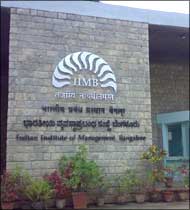Pankaj Chandra, director of the Indian Institute of Management Bangalore, says it's time now to take on the INSEAD and IMDs of the world.
 Samir Barua, his counterpart at IIM Ahmedabad, talks about the need for IIMs to go abroad as a common brand rather than individual institutions.
Samir Barua, his counterpart at IIM Ahmedabad, talks about the need for IIMs to go abroad as a common brand rather than individual institutions.
Just days after the human resource development ministry's in-principle approval for IIMs to set up campuses abroad, India's premier B-schools have already started walking the talk.
Barua says the IIMs could explore the possibility of two or three institutes collaborating to set up a new campus abroad. "Of course, this would raise the question of the identity of the campus. We will take the discussions to our board of governors and faculty and think of how we could do it," he says.
Some directors think pooling their resources - financial and faculty - for their international foray makes eminent sense. "The faculty resources at IIMs are not identical. Some IIMs have more shortage in some areas and excess in some areas and vice versa. Two institutes deciding to work together can use this as an advantage, as the load will even out," says Barua.
Chandra on his part stresses the importance of "keeping the brand and its value in mind" before taking the proposal forward. He believes IIM-B is already an international B-school, owing to its various international academic linkages with some 90 management institutes around the world, including London Business School.
Pointing out that it's too early to talk about specific initiatives, the IIM-B director says the institutes will study which market they plan to be in, its size, the advantages, and what programme to offer, etc. It will take around six months to decide on these issues.
The first among the IIMs to think of an international footprint, around four years ago, IIM-B came up with the idea of a campus in Singapore, which was turned down by the then HRD minister Arjun Singh who felt there was a need to meet domestic demand first.
Along with an international presence, the IIMs say they want to have a mix of international students and their international linkages will help them achieve this.
"There is no point going abroad if we want Indian students. We get the best of them anyway. We need to look at an international pool of students, a class with a healthy mix of students from different parts of the world," says Chandra.
IIMs are still discussing the details. While Barua thinks the one-year executive management programme could be do-able, Chandra says he would love the Common Admission Test - a prerequisite for MBA aspirants in India - to be a global examination.
Industry players, however, say it could be a difficult proposition and GMAT could be a more feasible option. "The top IIMs do admit students for the one-year management programme on their GMAT scores, so that is a universally acceptable examination for management students," says an IIM professor.
IIMs say it's too premature to talk about the cost factor at present. Manipal University, which has gone international with its campuses in Dubai, Nepal, Malaysia and Antigua, says setting up a management institute internationally does not require as much infrastructure as other streams like medicine and engineering do.
The IIMs, however, are confident that an IIM campus abroad will be financially viable since the fees will be of international standards and therefore much higher than that Indian fees.
"I do not think the government will provide any funds for this but I don't think getting funds will be a problem for the IIMs as a feasible fee and revenue model will be worked out by IIMs if and when they choose to go abroad," says Barua.
Indian institutes with campuses abroad generally go for a two-cycle approach which involves setting up operations through a rented place for two years and branching out to their own campuses in three years time.
"It is always better to start with rented premises which help the institute get quickly off the ground. This would give them time to gauge the best place to set up campus and so on," adds Sudarshan.








